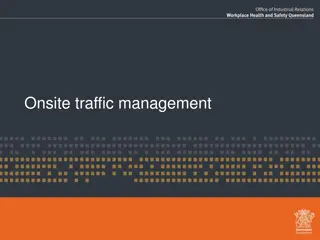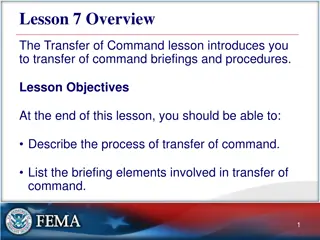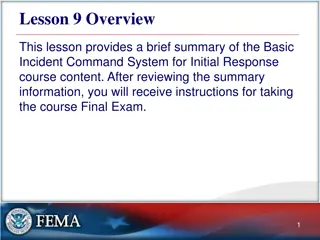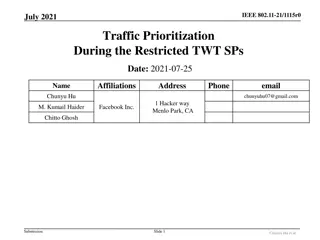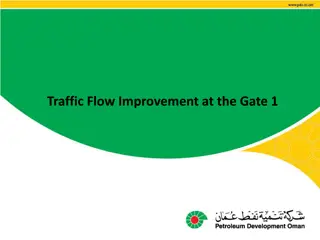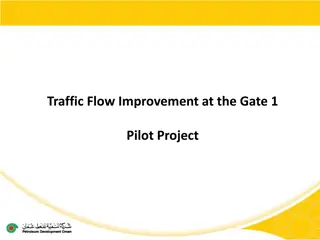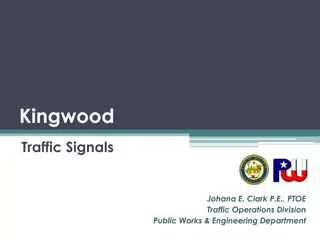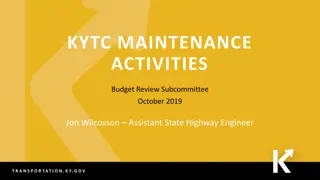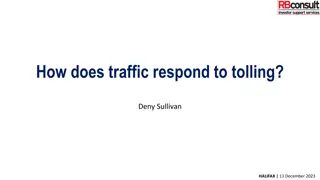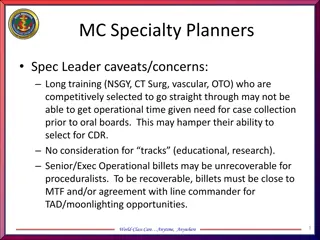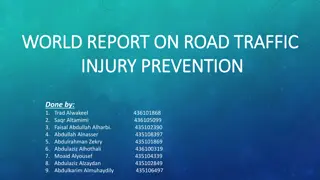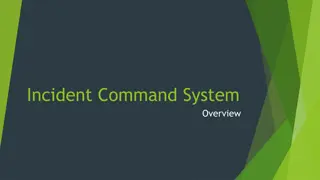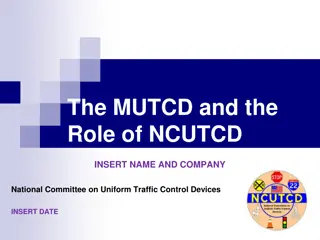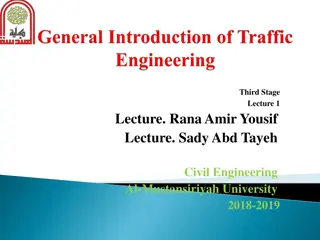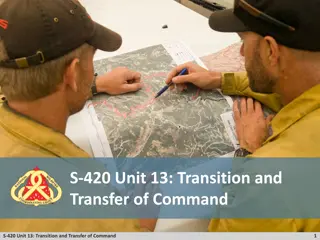Enhancing Field Command Operational Activities in Traffic Management
The Federal Road Safety Corps implements a structured field command system to enforce traffic laws in Nigeria. This system includes Zonal, Sector, and Unit Commands with a focus on ensuring highway safety, effective patrols, stakeholder relationships, and timely rescue services. The objective is to equip participants with the tools for operational excellence, covering various operational activities such as patrol operations and supervision at the unit level.
Download Presentation

Please find below an Image/Link to download the presentation.
The content on the website is provided AS IS for your information and personal use only. It may not be sold, licensed, or shared on other websites without obtaining consent from the author. Download presentation by click this link. If you encounter any issues during the download, it is possible that the publisher has removed the file from their server.
E N D
Presentation Transcript
IMPROVING OPERATIONAL ACTIVITIES IN FIELD COMMANDS
The FRSC establishment Act, 2007 section 10 provides for the Operational arm of the commission known as the Corps which is saddled with the onerous responsibility of control, administration, management and enforcement of all traffic laws in Nigeria. To effectively perform this function the Corps carved out a 3 tier system of field Operations thus: Zonal Command Sector Command Unit Command At the unit Command level, Operations department is headed by the Unit Head of Operations (UTHOOPS) who is expected to be a Chief Route Commander by rank. He must be versatile, smart, courageous and enamored with robust ideas in patrol, and rescue activities as well as intelligence gathering.
The management of CommandsOperations must be tailored towards. Making the highway safe for motorists and other road users. a. Clearing of obstructions arising from Road traffic crashes or breakdown of vehicles b. Ensuring effective and regular patrol Operations on its routes c. Ensuring good and healthy working relationship with stakeholders like the NURTW, RTEAN, MTUN, ACOMORON, Security agencies as well as the host community. d. Providing prompt rescue services to victims of RTC and other related accidents like plane crash, flood victims, fire accident etc. e. Liaising with other departments in the Command with a view to achieving set target which must be in tandem with the strategic goals set out by RSHQ annually. f.
AIM: The aim of this lecture is to equip the participants with the requisite tools necessary for optimum performance operationally. OBJECTIVES: It is expected that this lecture will help the participants to a. Identify the types of Operations. b. Enumerate the types of Operational instruments. c. Be able to plan an operation. d. Be familiar with the mobilization and deployment of human and material resources. e. List the steps taken to supervise operational activities at the Unit level. f. Be conversant with operational report rendition. g.
Patrol Operation is preventive enforcement technique aimed at making road users conform to traffic regulation. This activity involves detection, apprehension sun, adjudication and meting of punishment to any erring road user. Command operation at the Unit therefore is divided into two. Routine Patrol: This refers to the regular patrol activities carried out by Command operatives on designated routes. It runs on 2 shift basis a. Morning: 0600hrs- 1300hrs Afternoon: 1300hrs- 1800hrs This type of patrol includes: Mobile speed control a. Static speed control b. Surveillance patrol c. Rescue mission d. Foot team patrol e. Metropolitan bike patrol f.
Special patrol: This type of patrol is usually carried out to specifically address some lingering or recurring problems, it s a form of intervention to address or correct certain lapses noted. This type of patrol includes: Mobile Court patrol a. Operation good morning b. Night patrol c. Free vehicle check d. Operation Zero (xmas and new year special patrols) e. Eid-el-kabie and eid-el fitri (Sallah special patrol) f. Easter special patrol g. Independence Anniversary h. Special events (ECOWAS Heads of state meeting, sporting activities e t c) i.
To effectively manage the operational activities at the unit level the Head of Operations must be conversant with the following operational instruments among others. National Road traffic regulation 2012 Road maps Federal Road Safety (est.) Act, 2007 The Nigeria Highway code The Nigeria constitution Federal Road Safety regulations on the maintenance of discipline The Federal Road safety strategic goals The NRSS document The DSSP policy The School Bus document The National driving school policy The RTSSS document
It is often said that he who fails to plan, plans to fail, therefore planning of an operation requires a high degree of meticulousness. It is aimed at clearly spelling out duties and responsibilities of those to be detailed during and after the operations. A Template as designed by RSHQ will suffice.
FEDERAL ROAD SAFETY CORPS OPERATIONS DEPARTMENT NATIONAL HEADQUARTERS, ABUJA Reference . Date OPERATION ORDER NO . (SN/YEAR) .. OPERATION CODE . SITUATION: (Prevailing situation warranting operation) MISSION: (Where & objectives of operation spelt out) MANPOWER DEPLOYMENT: (Where personnel will be pooled from and pasted to) EXECUTION: (Modalities to be embarked upon to successfully prosecute operation e.g. deployment and assignment of responsibilities) Head of operations .. (Responsibilities) Duty Room Officer (Responsibilities)
Field Commander (Responsibilities) Team/ Squad Leader . (Responsibilities) Logistics Officer (Responsibilities) Provost (Responsibilities) Rescue (Responsibilities) Int . (Responsibilities) ADMINISTRATION: Transport (Those expected for the operation to be listed out)
Communication (Relevant ones to be listed e.g. walkie talkies. CUGs including numbers and names of handlers) Timing (Commencement, shifts etc) Dressing (Dress code) Security Equipment (e.g spray pepper, handcuff, stun gun etc.) f. Other equipment (Stretchers, flash bars etc) Briefing (Time and place of briefing prelude to operation)
Friendly Forces a. Military units reroute The Police NSCDC iii. Other system elements reroute b. Dissidents Armed Robbers Saboteurs iii. Anti FRSC element i. ii. i. ii.
COMMAND & CONTROL Coordinator (Name of coordinator) Operation Commander (Name of supervising Officer for the specific operation) Grand Commander (Usually COMACE or highest Officer within) Stand down Order (Will be at the instance of the Grand Commander)
MOBILIZATION RESOURCES AND DEPLOYMENT OF HUMAN AND MATERIAL Operational activity is the pivot of FRSC function, hence a successful operations depends largely on the effort and time put in to ensure adequate mobilization and deployment of human and material resources. Personnel of every unit Command who are within the patrol bracket are usually engaged in such operations with additional support from adjoining Commands. In addition personnel from the NSCDC, Police, SSS, are also mobilized to beef up the number and provide security backup. The following items must be made available to ensure smooth and hitch free operations. i. Authority devices ii. Rescue devices iii. Protective devices iv. Auxiliary devices v. Security devices vi. Stationeries vii. Communication devices
SUPERVISION OF OPERATIONAL ACTIVITIES IN FIELD COMMANDS: Supervision perspectives of monitoring and regulating of processes or responsibilities. could be viewed from the A supervision starting from the level of Unit Commander, UTHOOPS, officer down to the intelligence operatives. Therefore the Head of Operations is to ensure that; successful operation requires close Staff Ops, field
Patrol vehicles are mechanically fit for the operation i. Personnel to be deployed are properly briefed and primed for the operation. ii. Operatives are smartly and neatly dressed with PIN /Name tag affixed. iii. The safety and security of the patrolmen is paramount. iv. All the necessary devices are in place and functional v. Routine and surprise checks are carried out in the duty room by the UTHOOPS, Unit accountant or the UIO. Aggrieved customers are properly educated and enlightened by the PE, duty room or duty officers. vi. Report of patrol activities are properly documented in all the registers. vii. The Commander is adequately briefed on operational activities of the Command. viii.
METHOD OF SUPERVISION Surprise checks i. Use of informants ii. iii. Phone calls
OPERATIONAL REPORT RENDITION Report rendition is a very critical requirement for assessment of operational activities in FRSC. This subhead is allocated about 20% in the criteria for Command ranking. Report rendition must be timely, precise characteristics; and accurate with the following Should be based on facts, verifiable information with valid proofs i. Clear and easily understandable ii. Assist in decision making iii. Result oriented iv. Well organized and structured v. Must follow approved or recommended format. vi. In FRSC report rendition occupies a prime position and attracts penalty for in accurate, late or non-rendition.
Patrol report 1. Daily situation report (SITREP) 2. Weekly executive summary 3. Special patrol reports 4. Operation eagle eye 5. Free safety vehicle check 6. Operation Zero 7. Monthly and quarterly reports 8. Mobile court reports 9. Patrol officers assessment report 10. Road traffic crash report 11.
Management of the Command operation is a topic which cannot be exhausted easily, however it must be emphasized that anybody that is assigned this responsibility should as a matter of necessity be one who has the field experience as a patrol operative, intelligent, result oriented officer, a Social worker, a research and above all a good human relations person with great passion for the job.






